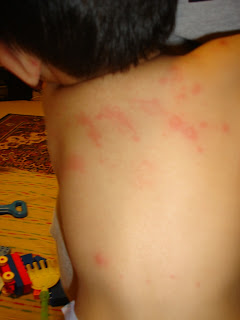Why Drug Allergies Matter (Or Why Penicillin Allergy is Responsible for My Son's Lopsided Neck)

My 6 year son old just got over a rite of passage - strep throat and scarlet fever. Unfortunately, before we could even celebrate his recovery, I noticed a swelling on the left side of his neck. It was red and tender, and it was GROWING. The pediatrician in me worried, "Damn. Lymphadenitis (infected lymph node)". No sooner had we finished one course of antibiotics than we were onto another, and the side effects were bad enough to keep him out of school for another three days. Why did my munchkin suffer so? My answer: Drug allergy. Group A streptococcal bacteria (the cause of strep throat and scarlet fever) is remarkably sensitive to penicillin. Penicillin is the first choice treatment for strep throat, and has been proven to reduce the risk of developing rheumatic fever, a post-infectious complication which can result in chronic heart disease. Problem is, my son is allergic to antibiotics in the penicillin family. At 11 months of age (8 days into his second ever co...